Trailering Your Boat
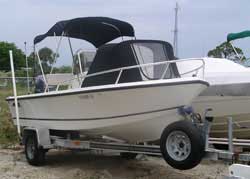 According to the Florida Sea Grant study "Recreational Boating Characterization of Collier County August 2009 approximately 44% accessed the waterways from a Boat Ramp.
According to the Florida Sea Grant study "Recreational Boating Characterization of Collier County August 2009 approximately 44% accessed the waterways from a Boat Ramp.
Source: Florida Sea Grant
It is a common site on our roadways to see vehicles trailering boats. People bring their boats here from all over the country to enjoy our easily accessed waterways. Down in The Keys, there is a boat ramp in most neighborhoods and you can see boats on trailers in most yards!
Trailering takes a little more work to get on the water but worth the effort!
Vehicle and Trailer Setup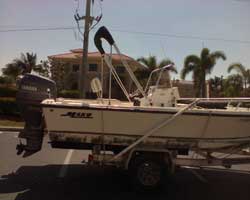
Always secure your boat to the trailer before getting on the roadway, the winch pull is not enough to hold the boat on the trailer. Securely tie lines from the front and back of the trailer around the top side of the boat like shown in this photo.
Boat Launch Sites
Visit our webpage Boating Launch Sites for a complete listing of launch sites in Florida.
Regulations
We don't mean to be stuffy, but in order to ensure our waters remain safe and enjoyable, know Florida boating and fishing regulations before you venture out. The information provided on Florida Go Fishing with give you an overview of our regulations.
"Florida law requires boat trailers to have proper lighting including turn signals, tail lights, and brake lights. Trailers must be equipped with safety chains and tie-down straps. Trailers weighing more than 3,000 lbs. must be equipped with brakes that act on all wheels. Trailers weighing less than 2,000 lbs. must be registered with the county tax collector. Trailers weighing 2,000 lbs. or more must be registered and titled." See Boating Regulations and Fishing Regulations.
Invasive Species Warning
Always clean in inspect your boat, vehicle and trailer for Hitchhikers, plants and aquatic life, to prevent the spread of invasive species. You could inadvertently transpo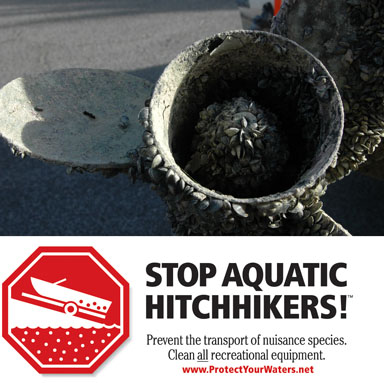 rt plants and animals from one body of water to another with your boat and trailer.
rt plants and animals from one body of water to another with your boat and trailer.
Freshwater & Marine Pests can:
? Damage your boat
? Increase your fuel and maintenance costs
? Impact on fishing
? Destroy the marine environment
? Threaten human health
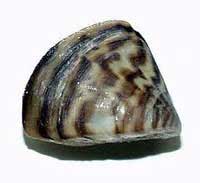 The invasive Zebra Mussel (Dreissenid) has plagued freshwater lakes, rivers and reservoirs in many states, displacing native aquatic life and causing billions of dollars of structural damage. The Zebra Mussel has not invaded Florida, so awareness of this threat can help keep this species out of our waters.
The invasive Zebra Mussel (Dreissenid) has plagued freshwater lakes, rivers and reservoirs in many states, displacing native aquatic life and causing billions of dollars of structural damage. The Zebra Mussel has not invaded Florida, so awareness of this threat can help keep this species out of our waters.
Zebra mussels are thumbnail-size bivalves with black and white stripes and are very prolific reproducers with no natural enemies. They first arrived in North America in 1986 in the bilge water of Russian freighters. Currently they have invaded Alaska, Arizona, California, Colorado, Idaho, Iowa, Kansas, Missouri, Montana, Nebraska, New Mexico, North Dakota, Nevada, Oklahoma, Oregon, South Dakota, Texas, Utah, Washington, and Wyoming.
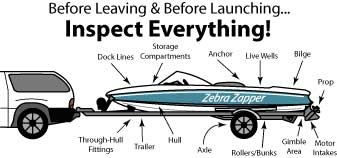 |
| Source: http://www.100thmeridian.org/ |
Keep Florida free of this invasive species. Please inspect your boat and trailer before trailering to Florida. For further information:
- University of Florida "Discovery Of Invasive Zebra Mussel Prompts Warning From State Officials"
- 100th Meridian Initiative is a cooperative effort between local, state, provincial, regional and federal agencies to prevent the westward spread of zebra/quagga mussels and other aquatic nuisance species in North America.
- Protect Your Waters is a website for recreational users who want to help stop aquatic nuisance species.
- Colorado Division of Wildlife "Watercraft Cleaning to Prevent the Spread of Invasive Species"
- Biosecurity New Zealand "Marine Biosecurity - Vessel Cleaning"













